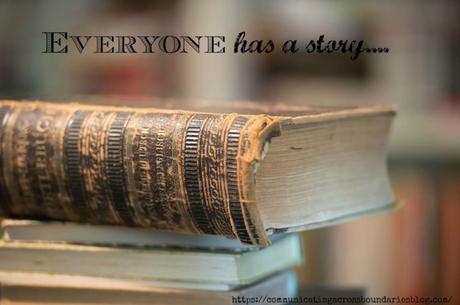
"An Irish proverb says, 'It is in the shelter of each other that the people live.' We can give shelter to each other by telling stories of what it means to be human, and by listening generously."*
A few years ago I had a long conversation with a physician. The physician was ethnically Indian, but had moved to the United States, become a citizen, and had built up a primary care practice in a suburb of Boston. She came up to me after I had given a talk on the importance of culture and health care.
She relayed the story of some Brazilian patients that came to her practice. "I didn't like them" she said. They were noisy, always had a lot of questions, and came to appointments with lots of family members. She would dread it when she looked at her daily schedule and saw that one of these patients was coming. She just knew that visits from these patients would put her behind schedule and cause chaos in her brain and her office.
Then one day, she unexpectedly had a bit more time. She stepped away from her computer and stethoscope and into the realm of human dialogue with a Brazilian woman. This wasn't the first time she had cared for this patient, but it was the first time that she had asked her about more than her symptoms. She ended up in a conversation about family, about Brazil, and about how the woman came to the United States. Instead of the appointment ending in a sigh of relief that it was over, she found herself reluctant to say goodbye. The next time the patient came, the doctor did the same thing. She ended up learning more of the woman's story, and then the story of her family. She stopped seeing these patients as a bother, and began seeing them for who they were and the stories they carried.
It wasn't long before the entire community had learned that this doctor was different. This doctor cared. This doctor liked them. Go to this doctor, they said to each other. She'll take good care of you.
Our world faces a massive empathy problem, an inability to listen to, much less like, those who see the world differently. The story of this doctor shows that when we take a step back and really listen, really get to know someone, our attitudes can change. It is not the only story like this one. In fact, there are many more that tell of how perceptions and feelings toward people changed, once they heard the story behind the person.
A recent article in the Plough quarterly called "Meet a True Storytalks about the resurgence in storytelling in the United States. The article begins with these profoundly true words: " Technology feeds our insatiable hunger for stories, but fails to satisfy our need for human connection"
The article goes on to talk about a couple of different storytelling programs that serve to help build empathy. One of these is a program that helps people inhabit another person's story. The idea is simple: You listen to another person's story - not with the intent to respond to it, but with the intent to retell it as your own story in first person pronoun. It changes the dialogue completely because in order to do this you have to live in the story of another; often another who you don't agree with or like.
Dismantling our enemies requires at least three steps: proximity, curiosity, and humility. We must be close enough to listen, curious enough to want to know more than we already do about the other's story, and humble enough to wonder if perhaps we've been wrong about the other all along. If we can....get close enough to hear the story of our enemy, we may be able to subvert the narrative of fear that has controlled us for far too long.There is a lot of fear in our world. I see and hear the fear every day. It is fear of the other, it is fear that "our way of life"(whatever that may mean) is going, and it is fear that the views of others may hurt our tightly held beliefs.
In the case of the doctor that I relayed above, her life and her practice became richer as a result of her willingness to move from prejudice to really getting to know someone. In really listening to her patient, she began to empathize. When she stopped seeing her Brazilian patients for the chaos she felt they caused, and instead entered into their stories, her attitudes and behavior toward them changed. The last I heard, she had decided to break down a wall in her practice to make more room for family members to come to appointments. She is beloved and trusted in the Brazilian community.
This can be us. If we take a step forward to listening to the story of another, we can learn and grow in respect and love for those who are different from us. We can begin to love the respect the one who is other and love the one who we used to fear. People are more than the views they hold. They are mothers and fathers, daughters and sons, friends and co-workers.
As the quote above says, there are three ingredients. We must be close enough to listen, curious enough to want to know more, and humble enough to admit when we might have been wrong. The ingredients are simple, but the work is hard. Can we do it?
If we want to change the current climate, I don't think we have a choice.*From Plough Quarterly " Meet a True Story"

